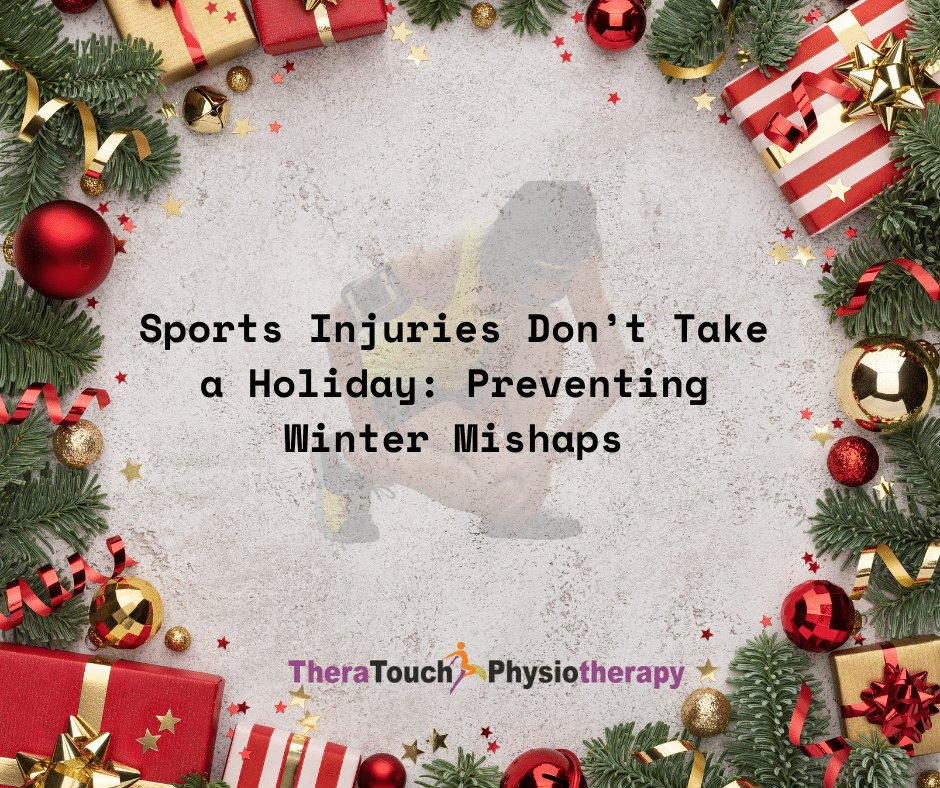Sports Injuries Don’t Take a Holiday.
Sports injuries are things to look out for. As the cold weather rolls in, winter activities like skiing, snowboarding, ice skating, and walking through snowy streets bring excitement and joy. But alongside the fun comes an increased risk of injury. Whether you’re an experienced skier or simply enjoying a winter stroll, it’s essential to protect yourself from injuries that can put a damper on your holiday season.
Let’s explore why winter activities pose a higher injury risk, how you can prevent common mishaps, and what to do if an injury does occur. By using the POLICE method, you’ll be better prepared to handle injuries effectively and get back to your favorite activities in no time.
Why Winter Activities Increase Injury Risk
Winter sports and outdoor fun demand a lot from your muscles, joints, and bones this when sports injuries occur. Cold weather makes muscles more prone to stiffness, while slippery conditions heighten the likelihood of falls. Common injuries include sprains, strains, fractures, and joint injuries, especially in the knees and ankles. Beginners in skiing or snowboarding are particularly at risk as they navigate new movements and techniques.
The good news? With proper preparation and mindfulness, you can enjoy winter activities safely while minimizing the risk of sports injuries.
Preventing Injuries During Winter Activities
Warm Up and Stay Flexible
Cold muscles are injury-prone, so a proper warm-up is non-negotiable. Spend 10 to 15 minutes on light cardio like walking or jogging, followed by dynamic stretches targeting your legs, hips, and core. These warm-up exercises improve blood flow, enhance flexibility, and prepare your body for activity, reducing the risk of strains and sprains.
Wear the Right Gear
From head to toe, your winter gear matters. Choose footwear with excellent traction to prevent slipping on icy surfaces. If you’re skiing or snowboarding, make sure your equipment fits properly and suits your skill level. Helmets and protective padding are essential to safeguard against impacts.
Know Your Limits
While it’s tempting to push yourself to try harder slopes or go the extra mile, staying within your skill level is crucial. Overexertion can lead to fatigue, making you more susceptible to accidents. Take breaks as needed, and don’t hesitate to stop when your body signals it has had enough.
Perfect Your Posture and Technique
Good posture plays a vital role in preventing injuries. Whether skiing, skating, or snowboarding, maintaining proper alignment reduces strain on your joints. For instance, in skiing, bend your knees slightly and keep your weight evenly distributed for better control and balance. Proper form can make a world of difference in injury prevention.
Stay Hydrated and Energized
Dehydration in cold weather might not seem obvious, but it can lead to muscle fatigue and slower reaction times. Drink water consistently throughout the day, especially after intense physical activities. Keeping your energy levels up with nutritious snacks also ensures your body performs at its best.
Using the POLICE Method for Winter Injuries
Even with precautions, sports injuries can happen. If you find yourself dealing with a sprain, strain, or minor injury, the POLICE method provides an updated approach for treatment:
Protect: Immediately stop the activity and protect the injured area to avoid further harm. Use a sling, brace, or support if needed.
Optimal Loading: Unlike the older RICE method, POLICE encourages controlled movement rather than complete rest. Gentle, pain-free movements can help maintain circulation and prevent stiffness.
Ice: Apply ice to the injured area for 15 to 20 minutes every couple of hours to reduce pain and swelling.
Compression: Use an elastic bandage to provide compression, which helps minimize swelling and provides support. Ensure it’s snug but not too tight to avoid restricting circulation.
Elevation: Raise the injured area above heart level whenever possible to decrease swelling and promote healing.
When to Seek Professional Help
If your injury doesn’t improve within a few days or you experience severe pain, swelling, or loss of mobility, it’s time to consult a physiotherapist. Early intervention prevents complications and speeds up recovery.
How TheraTouch Physiotherapy Can Help
At TheraTouch Physiotherapy, we understand how frustrating injuries can be, especially during the holiday season. Our skilled team offers personalized treatment plans to help you recover quickly and safely. Whether you need manual therapy, strengthening exercises, or advice on improving your technique, we’re here to support your journey back to health.
Embrace Winter Safely
The holiday season should be about joy, laughter, and making memories; not nursing an injury. By taking the right precautions when needed, you can fully enjoy all that winter has to offer. And remember, TheraTouch Physiotherapy is always here to help if you need expert care to stay active and pain-free.

